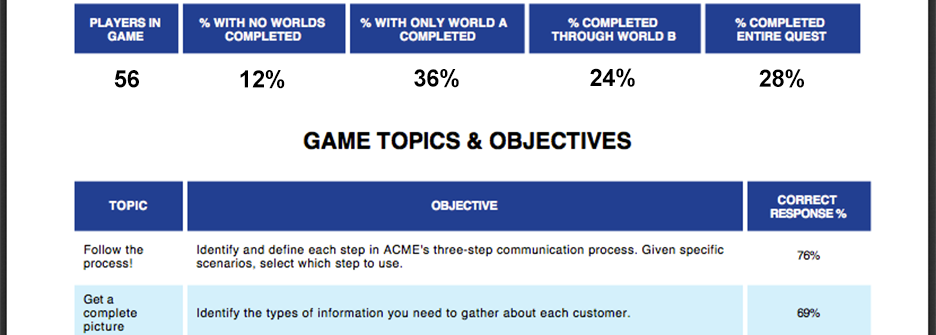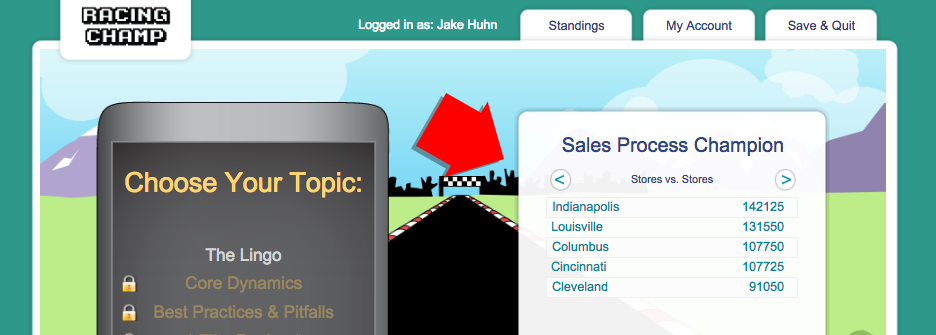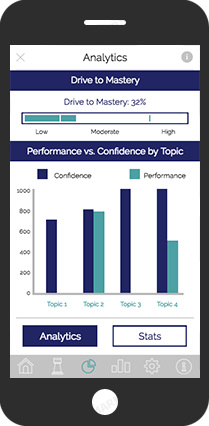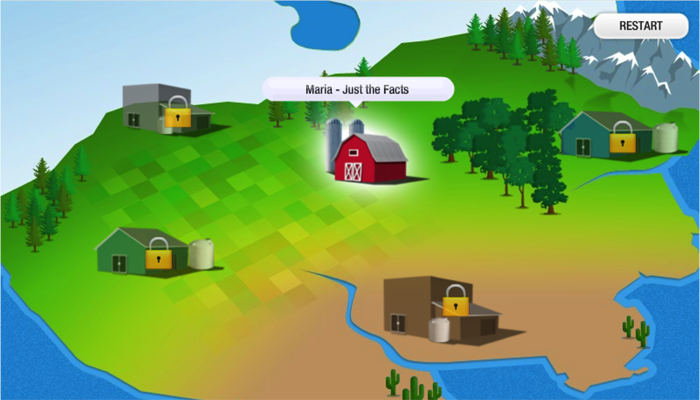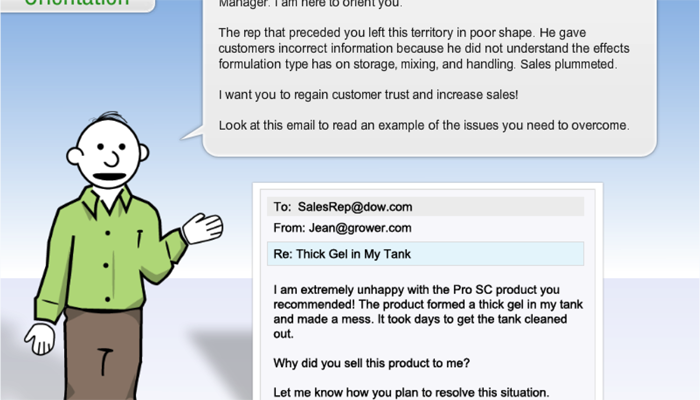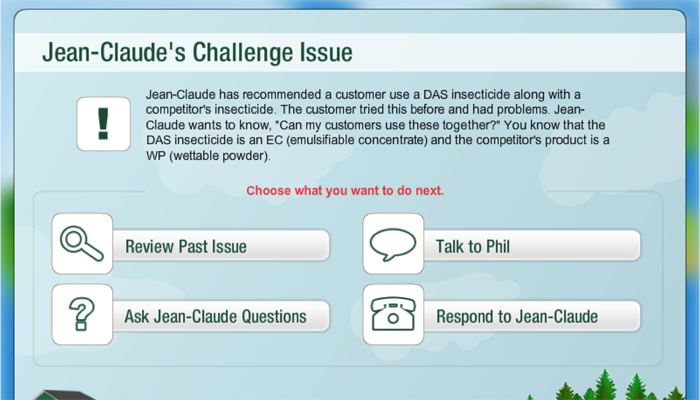

I interviewed Paula Rossini, Global Program Manager at Cisco, to learn more about how Cisco uses Knowledge Guru games to teach its sales associates. Cisco’s sales associate training program (CSAP) has won multiple Brandon Hall awards for its innovative approaches, including a 2014 “Gold” award won in partnership with BLP.
Can you describe your role at Cisco?
I’m a Global Program Manager. I focus mostly on content development and delivery of different programs within our worldwide sales and partner enablement organization. I focus mostly on new hires and early-in-career employees.
The Cisco Sales Associate Training Program (CSAP) is our keystone program along with the Partner Sales Academy (PSA). We also have a new hire acceleration program (SNAP) and a new internship program for university students.
What learners do you use Knowledge Guru games with?
We first introduced Sales Guru (the name we gave our Knowledge Guru games) games for sales associates and engineers in the CSAP program. It’s used as a reinforcement tool.
We now have Sales Guru games for the SNAP new hire acceleration program. While the games are a reinforcement tool in the CSAP program, for SNAP we use it as an assessment tool. You’d think it was daunting to use it as an assessment tool… but SNAP associates already have experience selling, so it’s a more mature audience. They can play the game as often as they want until they pass.
How are the games part of a learning solution? What other pieces are involved in the training?
In CSAP, the associate goes through synchronous classroom training. This training is taught by a virtual facilitator. The facilitator uses Cisco Telepresence to give the virtual instructor-led training. For example, associates take Data Center as a six-day module. Every day they have 3.5 hours of training, and at the end of Day one the facilitator tells them to play the Sales Guru game in preparation for the next day. There is a schedule posted on the LMS where associates can see exactly when they need to play each game.
During each module, associates play part of the game at the end of day one, three and five. There is a frequency by which they are expected to play the game before they do the next one… which is part of how we use the repetition.
At the end of every technical module, we have “technical office hours” where the trainer goes through the entire module in summary format. The Sales Guru prepares associates for the assessment they take at the end of the module.
SNAP is an asynchronous virtual program. People go through a series of eLearning modules. For most of the technical eLearning modules, they have a Sales Guru game attached to each of them as a final assessment.
Was there a challenge you hoped to address by implementing Knowledge Guru games into the curriculum?
There are lots of highly technical concepts in the solutions we offer that are difficult to assimilate. Associates struggled a lot to understand these concepts. We felt that, through Knowledge Guru’s use of spaced repetition, we could teach the associates and engineers better.
We first launched the game with our toughest topic of all: “Data center.” Little by little, we rolled it out to other technologies. Knowledge Guru is a reinforcement tool for all of the technologies in the program.
What do you want the learners to know or do after playing?
We want them to be able to assimilate the technical content they learned in the module and pass their technical exam.
You mentioned to me that many of your learners are virtual. How have you worked to engage and connect learners with technology throughout the program, and how does Knowledge Guru fit into that effort?
We use Cisco TelePresence and Cisco WebEx to virtually facilitate the CSAP training. The Knowledge Guru games are launched from the LMS along with the rest of the program materials. We teach the learners virtually so that multiple locations throughout Europe can all be taught by the same facilitator.
What did you do to encourage adoption with players?
The success of the game really depends on the involvement of the facilitator who leads the session and the “producer”. The facilitator teaches the learners while the producer makes sure they are paying attention and completing pre and post work. The producer supports the facilitator on WebEx. The producer encourages learners to play the Sales Guru games throughout the module.
The really good producers have some best practices like leaving the leaderboard up, showing the associates who’s winning, and encouraging gameplay.
How did players access the games?
Players launch the games from the LMS. During the pre-work, they see what day they need to launch the game.
How did Cisco communicate about the games to learners?
All communication happens through the LMS. Associates can see all materials available in a single location. Both the facilitator and the producer encourage gameplay during the session. The games are also integrated into the slide deck of the facilitator… and the producer reminds them, too. Sometimes, the facilitators reward learners with some candy or some other small “prize.”
What results have you produced from the program with the help of Knowledge Guru?
We received very positive learner feedback from the Data Center game, so we expanded into other modules. After this expansion, we surveyed associates and found that they rated the game 4.93 out of 5 in terms of its value as a learning experience. They rated the repetition in the game a 4.93 out of 5 and said it was highly effective in helping them retain the content.
We receive continuous anecdotal feedback that associates really enjoy the game and that it helps them to understand the content better. They say that it really does help them to pass the exam. While not a direct correlation, we do have a 98% pass rate on the technical exam.
What have been the keys to successful implementation for you?
Collaborating with Bottom-Line Performance was very important. We had an honest partnership where Sharon (Boller) would tell us up front if she had concerns with how we planned to use the game. That honest collaboration led to success for us.
Project management was also important. As soon as we had the green light to proceed, BLP guided us through the process of creating our games. The BLP team helped us hit milestones every step of the way, and it made a really big difference. Now, we are at the point where the games have really become a part of our process, and it’s much easier to create and modify games.
The Brandon Hall “gold” award that Cisco won for its use of Knowledge Guru was the second in just a few years for the CSAP program. What do you think sets the program apart?
I like to say that, at Cisco, “we drink our own champagne.” Cutting edge technology is really important for us. When we have made mistakes along the way, we have taken those and turned them into lessons learned. We reflect on how we’ve done and take feedback very seriously. Associates and stakeholders in general provide feedback and we take that feedback, change, and go with what makes sense. We continuously evolve, and that is a big part of why we are doing really well.
In short, our keys to success are feedback, technology, not being afraid of change, and learning from mistakes.
What advice would you give to others on creating their first Knowledge Guru game, or bringing a serious game into their organization for the first time?
Start with the end in mind. Understand or identify what they want to accomplish. Based on those learning objectives, you can find out the best way to implement the game.
It’s also important to look around and do your due diligence for looking for the right learning partner. It doesn’t need to be a big one. Pick one that fits your needs the best and with whom you can have an honest conversation where the learning partner genuinely wants you to succeed. Don’t just pick biggest partner out there because they are big and reviews are good. Go with one that will meet your requirements.







